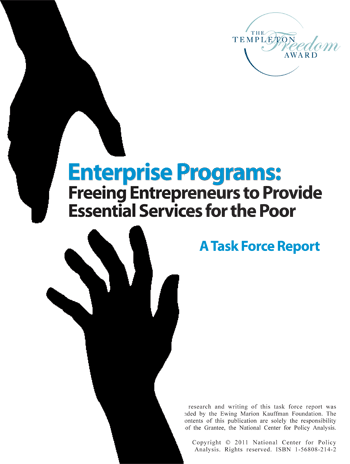Foreword
By Hon. Pete du Pont, former governor of Delaware
There is no more urgent task than getting people back to work and improving the prospects for economic progress of all Americans — especially the poor. Consider this: As of May 2011, 9.1 percent of Americans were unemployed and looking for work. But workers who are minorities, less educated and inexperienced face greater employment challenges than others. Among ethnic minorities, for example, the Hispanic unemployment rate was 11.9 percent and the African American unemployment rate was 16.2 percent. Unemployment of college graduates was half the overall national rate and one-third the unemployment rate of workers with less than a high school education. Among teenagers 16 to 19 years old, more than one in five was unemployed, and among black teenagers, more than four in 10 was unemployed.
How can we create job opportunities for those who face the greatest barriers to employment? This report suggests an approach that does not require a massive spending program; in fact, it uses private sector capital and talent. Furthermore, it does not require top-down direction from Washington; it can be implemented locally, by citizens, public officials and businesses working in concert. Finally, this approach not only creates jobs for some, but improves the living standards of others in the community.
This innovative concept is called Enterprise Programs. Its goal is to free entrepreneurs to provide essential services to the poor — such as transportation, child care, security, housing and health care. A task force from across the United States assembled by the National Center for Policy Analysis found that cost increasing regulations have priced low-income families out of the market for many services that are essential to their quality of life and prospects for economic progress. The task force members identified regulations that keep low-income families from enjoying the benefits of competition and entrepreneurship and force them to rely on less consumer-friendly public services instead. The alternative approach they propose is straight-forward: Lift regulatory barriers for individual entrepreneurs, businesses and charities who propose to serve primarily low-income populations.
As explained in this report, Enterprise Programs would benefit the consumers of the newly available services as well as create job opportunities for the workers who provide the services. Many of these services would create opportunities for the poor themselves to become entrepreneurs.
Cost-increasing regulations often make it prohibitive to provide low-cost services to the poor. Further, these unwise regulations affect low-income families in their role as providers as well as in their role as consumers. For instance, according to a recent study, 29 percent of all jobs now require a license. Many states impose formal educational requirements for occupations
that exclude workers with fewer credentials but more practical experience. In many cases, these services could be provided by individuals with less formal training, at a lower cost.
As this report shows, if they are freed from unnecessary regulations, entrepreneurs will provide services that would meet the needs of those at the bottom of the income ladder and open up job opportunities for them in the process. It is our hope that communities across the United States will pursue the possibilities presented by this unique and innovative idea.
Pete du Pont
Chairman of the Board,
National Center for Policy Analysis
